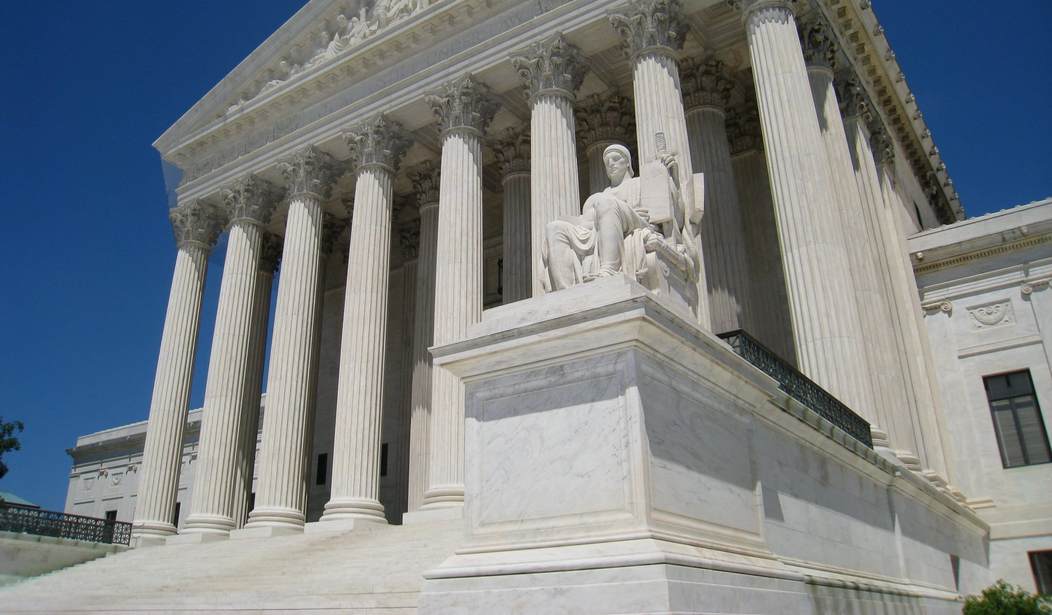In a victory for the rule of law, the Supreme Court defended President Donald Trump’s sovereignty over the U.S. military on Tuesday. Lower courts had issued a “stay” on Trump’s policy involving military service for transgender people, which a federal district court struck down. The Supreme Court refused to reverse the district court decision, which will allow Trump’s policy to come into effect.
The Court denied certiorari in three related cases: Trump v. Karnoski, Trump v. Jane Doe 2, and Trump v. Stockman. Each case challenged the president’s ability to determine who is and is not eligible for military service.
President Trump has declared his intention to prevent people who have been diagnosed with gender dysphoria or identify as transgender from serving in the military. His actual military policy, named “the Mattis Plan” after Secretary of Defense Jim Mattis, is narrowly tailored and allows some transgender people to serve within strict limitations.
The Mattis Plan was proposed last February, and the District Court of Washington, D.C. issued an injunction to prevent the policy from taking place. In a decision this month, however, the U.S. Court of Appeals for the D.C. Circuit struck down the injunction, arguing in part that the Mattis Plan is not a blanket ban on transgender people serving in the military.
“Although the Mattis Plan continues to bar many transgender persons from joining or serving in the military, the record indicates that the Plan allows some transgender persons barred under the military’s standards prior to the [previous policy] to join and serve in the military,” the court ruled.”The Mattis Plan, for example, contains a reliance exemption that will allow at least some transgender service members to continue to serve and receive gender transition-related medical care.”
The court further rejected the idea that “all transgender individuals either (1) have gender dysphoria or (2) transition to their preferred gender.” The judges argued that “we can find nothing in the record to support this definition of being transgender, as all of the reports supporting both the Carter Policy and the Mattis Plan defined transgender persons as ‘identifying’ with a gender other than their biological sex. Indeed, those reports repeatedly state that not all transgender persons seek to transition to their preferred gender or have gender dysphoria.”
According to the Mattis Plan:
Transgender persons with a history or diagnosis of gender dysphoria are disqualified from military service, except under the following limited circumstances: (1) if they have been stable for 36 consecutive months in their biological sex prior to accession; (2) Service members diagnosed with gender dysphoria after entering into service may be retained if they do not require a change of gender and remain deployable within applicable retention standards; and (3) currently serving Service members who have been diagnosed with gender dysphoria since the previous administration’s policy took effect and prior to the effective date of this new policy, may continue to serve in their preferred gender and receive medically necessary treatment for gender dysphoria.”
Similarly, “transgender persons without a history or diagnosis of gender dysphoria, who are otherwise qualified for service, may serve, like all other Service members, in their biological sex.”
Trump’s military policy clearly allows these people to serve in the military. Unlike Obama’s previous policy, it does not endorse gender identity over biological sex. Even so, it has a “grandfather” clause to allow service members who transitioned under the Obama policy to continue to serve, and even continue to receive gender transition medical “treatments.”
Transgender identity remains a divisive issue. Even radical feminists vehemently oppose gender identity activism, on the grounds that it erases women, forces lesbians to sleep with biological men, and seeks to turn lesbians into straight “men.”
“You can’t fight for the rights of women and girls if you can’t define that category correctly,” Kara Dansky, lawyer and spokeswoman for the feminist organization the Women’s Liberation Front (WoLF), told PJ Media in October. “Women have been oppressed and discriminated against for thousands of years on the basis of our biology,” not their gender identity. “Everybody knew what a woman was when they wouldn’t let us vote.”
Transgender activists have claimed that this is a civil rights issue, and that transgender identity must be recognized, celebrated, and accommodated in all sectors of society.
The legal challenge to Trump’s military policy represented one of many pushes against the rule of law in favor of forcing transgender ideology on Americans who disagree. The president is the commander in chief of the military, and if he disagrees with transgender identity and thinks it will undermine the military’s goals, he should be able to run the military according to that vision.
Cases against the policy will continue, but the Supreme Court decision allows the Trump administration to implement its policy in the meantime.
The Supreme Court made the right decision here, despite how loudly activists and liberals will complain.
Follow the author of this article on Twitter at @Tyler2ONeil.









Join the conversation as a VIP Member